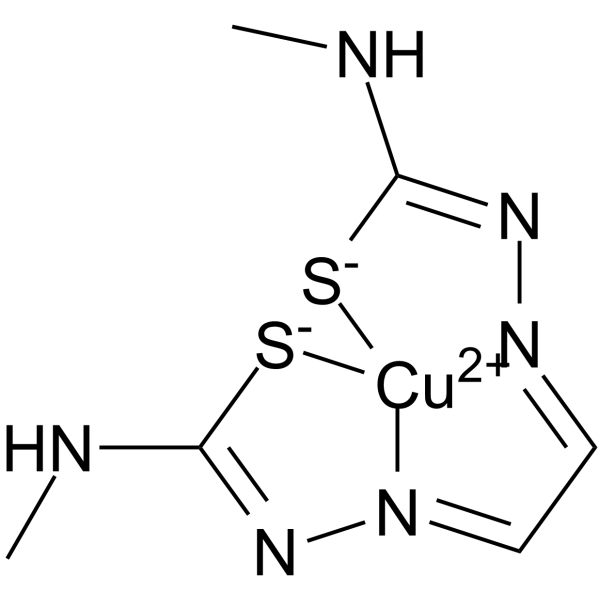Cu(II)GTSM
Modify Date: 2025-09-18 18:29:23

Cu(II)GTSM structure
|
Common Name | Cu(II)GTSM | ||
|---|---|---|---|---|
| CAS Number | 68341-14-0 | Molecular Weight | 293.86 | |
| Density | N/A | Boiling Point | N/A | |
| Molecular Formula | C6H10CuN6S2 | Melting Point | N/A | |
| MSDS | N/A | Flash Point | N/A | |
Use of Cu(II)GTSMCu(II)GTSM, a cell-permeable Cu-complex, significantly inhibits GSK3β. Cu(II)GTSM inhibits Amyloid-β oligomers (AβOs) and decreases tau phosphorylation. Cu(II)GTSM also decreases the abundance of Amyloid-β trimers. Cu(II)GTSM is a potential anticancer and antimicrobial agent[1][2]. |
| Name | Cu(II)GTSM |
|---|
| Description | Cu(II)GTSM, a cell-permeable Cu-complex, significantly inhibits GSK3β. Cu(II)GTSM inhibits Amyloid-β oligomers (AβOs) and decreases tau phosphorylation. Cu(II)GTSM also decreases the abundance of Amyloid-β trimers. Cu(II)GTSM is a potential anticancer and antimicrobial agent[1][2]. |
|---|---|
| Related Catalog | |
| Target |
GSK3β Amyloid-β oligomers |
| In Vitro | Cu(II)GTSM induces GSK3β phosphorylation at serine-9 (ser9) via its upstream kinase, protein kinase B (Akt), and aslo increases the phosphorylation of the associated extracellular signal-related kinase 1/2 (ERK1/2) in SH-SY5Y cells. Tau phosphorylation at ser404 was decreased in CuII(gtsm)-treated cells by 64%[2]. Western Blot Analysis[2] Cell Line: SH-SY5Y cells Concentration: 25 μM Incubation Time: 2 hours Result: Inhibits GSK3β and decreases Tau phosphorylation. |
| In Vivo | Cu(II)GTSM decreases brain Aβ trimer levels in AD mice, and can reverse cognitive deficits in APP/PS1 transgenic AD mice[2]. Animal Model: AD mice (K670N, M671L; 5-6 months old)[2] Dosage: 10 mg/kg Administration: Daily; p.o. Result: Restores cognitive performance of the AD mice to levels expected for healthy, cognitively normal mice. |
| References |
| Molecular Formula | C6H10CuN6S2 |
|---|---|
| Molecular Weight | 293.86 |
| InChIKey | ILQDIMXONQDSFP-NALDQGCSSA-L |
| SMILES | CN=C([S-])NN=CC=NNC([S-])=NC.[Cu+2] |